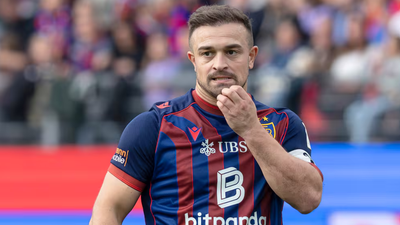FC Basel is once again under the spotlight in the Swiss Super League, not only because of their results but also because of the way their star man, Xherdan Shaqiri, dominates the team’s offensive game. At 33 years old, Shaqiri remains one of the most iconic players in Swiss football, a figure who carries both expectation and responsibility on his shoulders. Yet, his most recent performances have prompted discussions about whether Basel may be too dependent on him—and what risks this poses to their season.
The concern stems from Basel’s last three matches, in which Shaqiri’s impact was less pronounced than usual. In the Super League clash against Luzern, which ended in a 2-1 defeat for Basel, the Albanian-born playmaker was unable to produce a decisive contribution. While he did display flashes of quality with a few clever passes, he failed to register a goal or an assist, leaving Basel’s attack without its usual cutting edge.
Similar frustrations followed in the Europa League against Freiburg and in the Swiss Cup tie with Carouge. Against the lower-league side, Shaqiri even missed a penalty after being introduced from the bench—an unusual sight for a player typically celebrated for his composure and skill in high-pressure moments.
Coach Ludovic Magnin’s decision to substitute Shaqiri after just an hour against Luzern also drew attention. For Magnin, it was not a matter of punishing his star but rather a tactical necessity: the team needed freshness and new ideas, and Shaqiri’s energy levels seemed to dip. The problem Basel faces, however, is that once Shaqiri is removed from the equation, the offensive structure of the team becomes visibly weaker.
The statistics underline the scale of this reliance. Out of Basel’s 84 goals this year, a staggering 79 were scored while Shaqiri was on the pitch. Even more striking is the fact that, apart from two goals in the Swiss Cup against Biel, the team has not managed to score without him across 35 matches played in 2025. These numbers highlight not just Shaqiri’s individual brilliance but also the worrying lack of alternative sources of creativity and goals in the squad.
Magnin is fully aware of this dilemma. With Basel competing on three fronts—the domestic league, the Swiss Cup, and international competitions—managing Shaqiri’s workload has become a pressing issue. The veteran cannot be expected to play every match at full intensity, and giving him regular rest will be essential if he is to avoid injury or burnout later in the campaign.
This is why Magnin has been working on a “plan B.” Young striker Koba Coindredi is seen as the most suitable alternative to step into the number 10 role and share some of the attacking responsibility. Unfortunately for Basel, Coindredi was unavailable due to injury for the crucial matches against Freiburg and Luzern. In his absence, Ibrahim Salah was deployed as a replacement, but while hardworking, he lacks Shaqiri’s creative spark.
Despite the murmurs of concern, Magnin has defended his captain against criticism. “People are very harsh on him,” the coach said. “He is extremely important for us and everyone should understand that.” Indeed, Shaqiri remains Basel’s standout player this season with four goals and three assists in just seven league games. No other player in the Super League has matched his level of influence so far.
Still, the underlying question remains: can Basel diversify their attack enough to ease the pressure on their talisman? Football is a team sport, and overreliance on one player often leaves a club vulnerable when injuries, suspensions, or dips in form occur. For Basel, striking the right balance between maximizing Shaqiri’s qualities and developing reliable alternatives could determine whether this season becomes one of success or frustration.
For now, Shaqiri’s class and experience continue to light up Basel’s campaign. But unless others step up, any pause from him—whether through fatigue, form, or injury—could have a significant impact on the team’s trajectory in the months ahead.






















